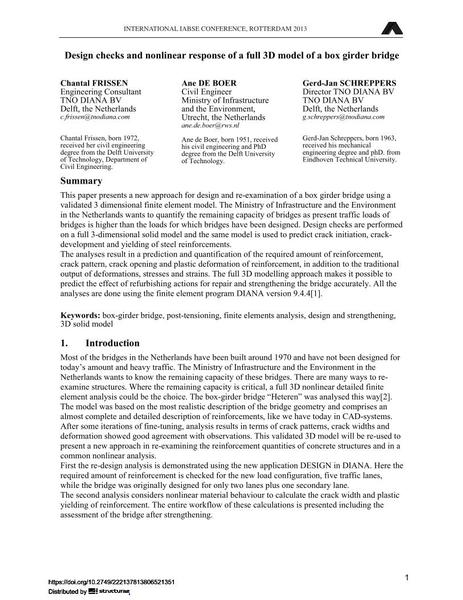Design checks and nonlinear response of a full 3D model of a box girder bridge

|
|
|||||||||||
Détails bibliographiques
| Auteur(s): |
Chantal Frissen
Ane de Boer Gerd-Jan Schreppers |
||||
|---|---|---|---|---|---|
| Médium: | papier de conférence | ||||
| Langue(s): | anglais | ||||
| Conférence: | IABSE Conference: Assessment, Upgrading and Refurbishment of Infrastructures, Rotterdam, The Netherlands, 6-8 May 2013 | ||||
| Publié dans: | IABSE Conference, Rotterdam, May 2013 | ||||
|
|||||
| Page(s): | 522-523 | ||||
| Nombre total de pages (du PDF): | 8 | ||||
| Année: | 2013 | ||||
| DOI: | 10.2749/222137813806521351 | ||||
| Abstrait: |
This paper presents a new approach for design and re-examination of a box girder bridge using a validated 3 dimensional finite element model. The Ministry of Infrastructure and the Environment in the Netherlands wants to quantify the remaining capacity of bridges as present traffic loads of bridges is higher than the loads for which bridges have been designed. Design checks are performed on a full 3-dimensional solid model and the same model is used to predict crack initiation, crack- development and yielding of steel reinforcements. The analyses result in a prediction and quantification of the required amount of reinforcement, crack pattern, crack opening and plastic deformation of reinforcement, in addition to the traditional output of deformations, stresses and strains. The full 3D modelling approach makes it possible to predict the effect of refurbishing actions for repair and strengthening the bridge accurately. All the analyses are done using the finite element program DIANA version 9.4.4[1]. |
||||
